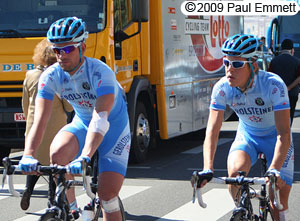 The Austrian National Anti-Doping Agency (NADA) has completed its investigation into the HumanPlasma blood bank in Vienna, acknowledging that the first cases against suspected dopers will begin soon. The case involves a doping ring revolving around Austrian Bernard Kohl’s manager Stefan Matschiner.
The Austrian National Anti-Doping Agency (NADA) has completed its investigation into the HumanPlasma blood bank in Vienna, acknowledging that the first cases against suspected dopers will begin soon. The case involves a doping ring revolving around Austrian Bernard Kohl’s manager Stefan Matschiner.
Kohl was one of three riders found to have taken CERA, the third generation EPO, in retroactive tests performed on his blood samples following the 2008 Tour de France. The Austrian won the King of the Mountains competition and placed third overall in the race.
NADA director Andreas Schwab said on Monday that the names of the individuals will be published as the proceedings begin. HumanPlasma management has admitted to collecting the blood from around 30 athletes from 2003 to 2006.
A report published by the Bundeskriminalamt (BKA) last year stated that countless blood transfusions took place in a one-room apartment in the Austrian city of Linz, that was rented by Bernhard Kohl, Olympic cross-country skiing champion Christian Hoffman and former Danish king of the mountains, Michael Rasmussen.
Kohl has admitted to having played an active role in the doping ring and has dropped Michael Rasmussen’s name several times. Last year former Rabobank riders Michael Boogerd and Thomas Dekker were also questioned by the BKA as part of their investigation.
The NADA will neither confirm nor deny whether any foreign athletes are among the suspects, but Schwab told Sporten.dk, “If there are cases against foreigners, it is international and the respective national drug agencies to initiate them.”
Kohl’s confession and willingness to cooperate with authorities represents a narrowing of the window of opportunity for cheats in the sport. There has been a positive trend where cyclists that have tested positive for banned substances confess and provide information to help uncover further doping activities. Continued cooperation by cyclists that have admitted their guilt, along with increased anti-doping measures, such as the UCI’s biological passport program, are making it increasingly difficult and risky to use banned substances.